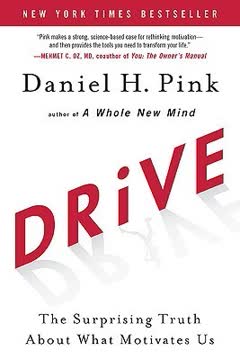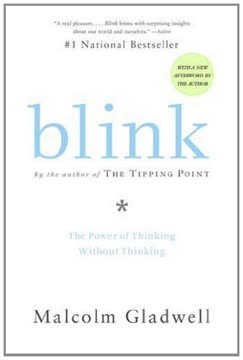نکات کلیدی
1. تأثیرات اولیه قدرتمند اما بالقوه گمراهکننده
"وقتی قضاوتی سریع انجام میدهیم، در یک لحظه انجام میشود. این همچنین به وضوح یک قضاوت است: احساسی به ما دست میدهد که بیان آن برایمان دشوار نیست."
ارزیابی سریع: مغز ما به گونهای طراحی شده است که در عرض چند ثانیه از ملاقات با افراد، قضاوتهای سریعی درباره آنها انجام دهد. این تأثیرات اولیه میتوانند در برخی جنبهها، مانند ارزیابی توانایی تدریس یا عملکرد در مصاحبه، به طرز شگفتآوری دقیق باشند.
مخاطرات بالقوه: با این حال، این قضاوتهای سریع اغلب بر اساس اطلاعات محدود و تحت تأثیر تعصبات و پیشفرضهای خودمان هستند. آنها ممکن است ما را به نادیده گرفتن جنبههای مهمی از شخصیت یا تواناییهای فردی که بهطور فوری قابل مشاهده نیستند، سوق دهند.
عملکرد متعادل: در حالی که تأثیرات اولیه میتوانند بینشهای شهودی ارزشمندی ارائه دهند، مهم است که به محدودیتهای آنها آگاه باشیم و بهطور انحصاری به آنها تکیه نکنیم. تصمیمگیری مؤثر، بهویژه در زمینههای حرفهای، نیازمند ارزیابی جامعتری است که عوامل و دیدگاههای متعددی را در نظر بگیرد.
2. افسانه استعداد: ارزشگذاری بیش از حد بر درخشش فردی
"شکست گستردهتر مککینزی و پیروانش در انرون این است که فرض میکنند هوش یک سازمان صرفاً تابعی از هوش کارکنان آن است. آنها به ستارهها اعتقاد دارند، زیرا به سیستمها اعتقاد ندارند."
سیستم بر ستارهها: بسیاری از سازمانها، تحت تأثیر مشاوران مدیریت، تأکید بیش از حدی بر جذب و پاداش دادن به عملکردهای فردی برتر دارند. این "ذهنیت استعداد" میتواند به نادیده گرفتن سیستمها و فرآیندهای سازمانی حیاتی منجر شود.
داستان هشداردهنده انرون: فروپاشی انرون خطرات اولویتبندی استعداد فردی بر ساختار و اخلاق سازمانی را نشان میدهد. با وجود استخدام تعداد زیادی "ستاره" از دانشگاههای برتر، نبود سیستمهای قوی و کنترلها منجر به سقوط شرکت شد.
رویکرد متعادل: سازمانهای موفق تشخیص میدهند که:
- استعداد فردی مهم است اما کافی نیست
- سیستمها و فرآیندهای قوی برای موفقیت بلندمدت حیاتی هستند
- فرهنگ همکاری اغلب از مجموعهای از ستارههای فردی بهتر عمل میکند
- رهبری مؤثر شامل ایجاد محیطی است که در آن استعداد بتواند در یک سازمان با ساختار خوب شکوفا شود
3. محدودیتهای پروفایلسازی جنایی و قدرت زمینه
"واقعیت این است که مجرمان مختلف میتوانند رفتارهای مشابهی را به دلایل کاملاً متفاوت نشان دهند."
مخاطرات پروفایلسازی: پروفایلسازی جنایی، با وجود محبوبیتش در رسانهها و اجرای قانون، اغلب به تعمیمهای سادهانگارانه متکی است و از پیچیدگی رفتار انسانی غافل میشود.
زمینه مهم است: تحقیقات نشان میدهد که رفتار افراد به شدت تحت تأثیر موقعیت و محیط فوری آنها است، نه اینکه صرفاً توسط ویژگیهای شخصیتی ثابت تعیین شود. این "خطای اساسی انتساب" ما را به اغراق در اهمیت شخصیت و کماهمیت دانستن قدرت شرایط سوق میدهد.
پیامدها برای اجرای قانون:
- دوری از پروفایلهای سختگیرانه مبتنی بر شخصیت
- تمرکز بر جمعآوری شواهد ملموس و درک عوامل موقعیتی
- توسعه رویکردهای پیچیدهتر و انعطافپذیرتر به تحقیقات جنایی
- شناخت محدودیتهای شهود کارشناسانه و پذیرش روشهای مبتنی بر داده
4. نقصهای مصاحبههای شغلی سنتی
"مصاحبه به طرز ناامیدکنندهای به نفع افراد خوشبرخورد است."
تعصبات ذاتی: مصاحبههای شغلی سنتی و بدون ساختار اغلب پیشبینیکنندههای ضعیفی از عملکرد واقعی شغلی هستند. آنها تمایل دارند به نفع داوطلبانی باشند که خوشبرخورد هستند و تأثیرات اولیه خوبی میگذارند، صرفنظر از صلاحیتهای واقعی یا تناسب آنها برای نقش.
دیدگاه محدود: برخوردهای کوتاه در یک محیط مصاحبه تنها دیدگاه محدودی از تواناییها و شخصیت داوطلب ارائه میدهند. مصاحبهگران اغلب بر اساس اطلاعات محدود تعمیمهای گستردهای انجام میدهند و به خطای اساسی انتساب دچار میشوند.
جایگزینهایی برای در نظر گرفتن:
- مصاحبههای ساختاریافته با سؤالات و معیارهای ارزیابی استاندارد
- آزمونهای نمونه کار یا شبیهسازیهایی که مهارتهای مرتبط با شغل را مستقیماً ارزیابی میکنند
- چندین دور مصاحبه با اعضای مختلف تیم
- در نظر گرفتن عملکرد گذشته و دستاوردهای ملموس
- ارزیابیهای شخصیتی در صورت مرتبط بودن با الزامات شغلی
5. پیتبولها و پروفایلسازی: خطرات تعمیمهای گسترده
"زیرا نمیدانیم کدام سگ کسی را گاز خواهد گرفت یا چه کسی دچار حمله قلبی خواهد شد یا کدام رانندگان در تصادف شرکت خواهند کرد، تنها میتوانیم با تعمیم پیشبینی کنیم."
ضرورت و خطر: تعمیمها اغلب برای تصمیمگیری و سیاستگذاری ضروری هستند، اما میتوانند به تبعیض ناعادلانه و سادهسازی بیش از حد مسائل پیچیده منجر شوند.
مشکل دستهبندی: تعمیمهای مؤثر نیاز به تعاریف واضحی از دستهها دارند، که اغلب در موقعیتهای دنیای واقعی چالشبرانگیز است. به عنوان مثال، "پیتبول" یک نژاد واحد نیست بلکه یک دستهبندی بهطور سست تعریفشده از سگها با ویژگیهای فیزیکی مشابه است.
عملکرد متعادل:
- شناخت سودمندی تعمیمها در برخی زمینهها
- آگاهی از محدودیتها و آسیبهای بالقوه دستهبندیهای بیش از حد گسترده
- جستجوی رویکردهای پیچیدهتر و مبتنی بر داده در صورت امکان
- بازبینی و اصلاح منظم تعمیمها بر اساس اطلاعات جدید
6. پیچیدگی شناسایی و پرورش استعداد
"موفقیت در اقتصاد مدرن، به گفته مایکلز، هندفیلد-جونز و اکسلرود، نیازمند 'ذهنیت استعداد' است: 'باور عمیق که داشتن استعداد بهتر در همه سطوح، راهی است که شما از رقبای خود پیشی میگیرید.'"
فراتر از توانایی خام: شناسایی و توسعه استعداد پیچیدهتر از صرفاً جذب "بهترین و درخشانترین" است. عواملی مانند فرهنگ سازمانی، تناسب شغلی و فرصتهای رشد شخصی نقشهای حیاتی در تعیین موفقیت فردی در یک شرکت ایفا میکنند.
ذهنیت رشد: تحقیقات روانشناس کارول دوک نشان میدهد که افرادی که معتقدند تواناییهایشان قابل توسعه است (ذهنیت رشد) اغلب از کسانی که استعدادهایشان را ویژگیهای ثابت میدانند، بهتر عمل میکنند. این موضوع برای نحوه برخورد سازمانها با توسعه استعداد و ارزیابی عملکرد پیامدهایی دارد.
رویکرد جامع به مدیریت استعداد:
- ایجاد سیستمهایی که به استعداد اجازه شکوفایی میدهند
- فراهم کردن فرصتهایی برای یادگیری مداوم و توسعه مهارت
- پرورش فرهنگی که ارزش همکاری و کار تیمی را میداند
- شناخت و پاداش بهبود و تلاش، نه فقط توانایی ذاتی
- همراستا کردن نقاط قوت فردی با نیازهای سازمانی
7. بازاندیشی در رویکرد ما به استخدام و ارزیابی
"پیشرفت اجتماعی، مگر اینکه مراقب باشیم، میتواند صرفاً وسیلهای باشد که با آن جایگزینهای آشکاراً دلخواه را با جایگزینهای نه چندان آشکار دلخواه جایگزین کنیم."
فراتر از تأثیرات اولیه: در حالی که شهود و شیمی شخصی در تصمیمگیریهای استخدام نقش دارند، تکیه بیش از حد بر این عوامل میتواند به انتخابهای متعصبانه و غیرمؤثر منجر شود. سازمانها نیاز به توسعه روشهای دقیقتر و عینیتر برای ارزیابی داوطلبان و کارکنان دارند.
رویکرد سیستماتیک: استخدام و ارزیابی مؤثر نیازمند یک استراتژی جامع است که فراتر از ارزیابی درخشش فردی باشد. این شامل:
- الزامات شغلی و معیارهای موفقیت بهوضوح تعریفشده
- فرآیندهای ارزیابی استاندارد
- در نظر گرفتن پویایی تیم و تناسب سازمانی
- ارزیابی و بازخورد مداوم عملکرد
- شناخت نقش سیستمها و فرآیندها در توانمندسازی موفقیت فردی
بهبود مستمر: همانطور که درک ما از رفتار انسانی و پویایی سازمانی تکامل مییابد، رویکردهای ما به مدیریت استعداد نیز باید تکامل یابد. بازبینی منظم شیوههای استخدام و ارزیابی، با اطلاع از دادهها و تحقیقات، برای ساختن سازمانهای با عملکرد بالا در اقتصاد مدرن ضروری است.
آخرین بهروزرسانی::
FAQ
What's "Personality, Character, and Intelligence: Part Three from What the Dog Saw" about?
- Collection of Essays: This section of Malcolm Gladwell's book is a collection of essays originally published in The New Yorker, focusing on themes of personality, character, and intelligence.
- Exploration of Human Behavior: The essays explore how we perceive and evaluate human behavior, often challenging conventional wisdom and assumptions.
- Diverse Topics: Topics range from the nature of genius and the effectiveness of job interviews to the reliability of criminal profiling and the myths surrounding talent.
Why should I read "Personality, Character, and Intelligence: Part Three from What the Dog Saw"?
- Insightful Analysis: Gladwell provides thought-provoking insights into how we understand and misinterpret human behavior.
- Challenging Assumptions: The book challenges readers to reconsider commonly held beliefs about intelligence, talent, and success.
- Engaging Writing: Gladwell's engaging storytelling and clear writing make complex ideas accessible and interesting.
What are the key takeaways of "Personality, Character, and Intelligence: Part Three from What the Dog Saw"?
- Genius and Precocity: Genius is often equated with early achievement, but Gladwell argues that late bloomers can be equally successful.
- Job Interviews: Traditional job interviews may not be as effective as we think in predicting job performance.
- Criminal Profiling: The reliability of criminal profiling is questioned, suggesting it may be more of an art than a science.
How does Malcolm Gladwell define "The Talent Myth"?
- Overemphasis on Talent: Gladwell critiques the idea that success is solely based on hiring and rewarding the most talented individuals.
- System vs. Stars: He argues that organizational success often depends more on systems and processes than on individual talent.
- Enron Example: The downfall of Enron is used to illustrate the dangers of overvaluing talent without considering systemic factors.
What is the "Quarterback Problem" as discussed by Malcolm Gladwell?
- Unpredictable Performance: The "Quarterback Problem" refers to the difficulty in predicting future performance based on past achievements, particularly in complex roles like NFL quarterbacks.
- Teaching Analogy: Gladwell extends this idea to teaching, suggesting that identifying great teachers is similarly challenging.
- Implications for Hiring: The concept questions the effectiveness of traditional hiring practices that rely heavily on past performance indicators.
What does Malcolm Gladwell say about "Late Bloomers"?
- Different Paths to Success: Gladwell argues that late bloomers often take a different path to success, characterized by experimentation and gradual improvement.
- Cézanne Example: He uses the example of the artist Cézanne, who achieved success later in life through persistent effort and refinement.
- Support Systems: Late bloomers often require support and patience from others to reach their potential.
How does Malcolm Gladwell critique "Criminal Profiling"?
- Questionable Accuracy: Gladwell questions the accuracy and scientific basis of criminal profiling, suggesting it may rely more on intuition than evidence.
- Case Studies: He examines famous cases, like the Mad Bomber, to illustrate the limitations and inconsistencies in profiling.
- Comparison to Cold Reading: Profiling is compared to cold reading, where vague and general statements can be interpreted as accurate.
What insights does Malcolm Gladwell offer on "Job Interviews"?
- First Impressions: Gladwell discusses how first impressions in interviews can be misleading and may not accurately predict job performance.
- Structured Interviews: He advocates for structured interviews, which focus on specific, job-related questions to reduce bias.
- Fundamental Attribution Error: The tendency to overemphasize personality traits and underestimate situational factors in interviews is highlighted.
What are the best quotes from "Personality, Character, and Intelligence: Part Three from What the Dog Saw" and what do they mean?
- "Genius, in the popular conception, is inextricably tied up with precocity." This quote challenges the notion that genius is only about early achievement, suggesting that success can come at any age.
- "The problem with picking quarterbacks is that Chase Daniel’s performance can’t be predicted." This highlights the unpredictability of performance in complex roles, questioning traditional evaluation methods.
- "The talent myth assumes that people make organizations smart. More often than not, it’s the other way around." This quote emphasizes the importance of systems and processes over individual talent in achieving organizational success.
How does Malcolm Gladwell address "Pit Bulls and Crime"?
- Generalization Issues: Gladwell explores the problems with generalizing about pit bulls as inherently dangerous, drawing parallels to how we generalize about crime.
- Instability of Traits: He discusses how the traits associated with dangerous dogs and criminals can be unstable and influenced by various factors.
- Policy Implications: The book questions the effectiveness of policies based on broad generalizations, advocating for more nuanced approaches.
What is the significance of "The New-Boy Network" in the book?
- Hiring Practices: "The New-Boy Network" examines the biases and limitations of traditional hiring practices, particularly the reliance on interviews.
- Chemistry vs. Competence: Gladwell discusses the tendency to hire based on personal chemistry rather than objective competence.
- Structured Approach: He suggests that a more structured approach to hiring could lead to better outcomes by focusing on relevant skills and behaviors.
How does Malcolm Gladwell use anecdotes and case studies in "Personality, Character, and Intelligence: Part Three from What the Dog Saw"?
- Illustrative Stories: Gladwell uses anecdotes and case studies to illustrate complex ideas and make them relatable to readers.
- Real-World Examples: He draws on real-world examples, such as Enron and the Mad Bomber, to challenge conventional wisdom and highlight key concepts.
- Engagement and Insight: These stories engage readers and provide deeper insights into the themes of personality, character, and intelligence.
نقد و بررسی
خوانندگان معمولاً کتاب آنچه سگ دید را جذاب و اندیشهبرانگیز مییابند و به دیدگاه منحصر به فرد گلادوِل در موضوعات مختلف ارج مینهند. بسیاری از آنها توانایی او در ارتباط دادن موضوعات ظاهراً نامرتبط و استخراج نتایج عمیق را تحسین میکنند. برخی از خوانندگان برخی مقالات را جذابتر از دیگران میدانند و بحثهایی دربارهی شکوفایی دیرهنگام، شیوههای استخدام و آزمونهای هوش از جمله موضوعات محبوب آنهاست. در حالی که بیشتر افراد از سبک نوشتاری گلادوِل لذت میبرند، عدهای به عمق تحقیق و تحلیل او انتقاد میکنند. بهطور کلی، این کتاب به خاطر تواناییاش در به چالش کشیدن تفکر متعارف و برانگیختن کنجکاوی، نقدهای مثبتی دریافت میکند.
Similar Books






















